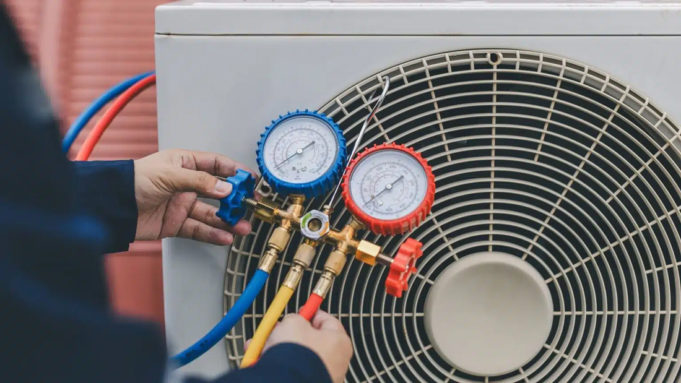If you’ve lived in Fort Worth longer than a single Texas summer, you already know our heat doesn’t mess around. It doesn’t tap you on the shoulder and whisper—it slaps you across the face and laughs while doing it. So when your air conditioner starts wheezing or making noises like it’s seen better days, your instincts might tell you to just patch it up again. But sometimes, a new unit really is the smarter choice, especially with how our local weather can chew up older systems. The key is knowing what to look for—and knowing what not to try fixing on your own.
Start With Age, but Don’t Stop There
Let’s get the obvious out of the way first: if your current unit is old enough to have seen the Bush administration (either one), it’s probably time to move on. Most AC units last around 10 to 15 years, give or take. And while it might still run past that point, “running” and “cooling efficiently” are two different things—especially with the kind of wear-and-tear North Texas weather brings.
Fort Worth summers don’t let AC units coast. They work long shifts every single day from May to October, often kicking on before breakfast and working straight through until bedtime. That kind of workload takes a toll. So even if your older system turns on, take a moment to ask yourself: are my energy bills higher than they used to be? Are some rooms still hot while others feel like a meat locker? Does the house smell…off, like warm dust or damp socks? If you said yes to any of that, it might be time to move past the repair-and-hope phase.
It’s Not Just About Cooling—It’s About Comfort
A new AC unit shouldn’t just chill the air. It should make the whole house feel evenly comfortable. In a city like Fort Worth where a 3 PM breeze can feel like a hairdryer, your AC needs to do more than pump out cold air—it needs to do it smartly. Look for features that adjust temperature room by room, if possible. Zoned cooling can save money and keep the always-hot upstairs from turning into a sweatbox.
Noise is another big one. Older units tend to grow louder with age. A new system will hum instead of clank, which matters more than you might think—especially if you’re working from home or have light sleepers in the house. Pay attention to the system’s SEER rating too. Without getting too technical, higher SEER ratings usually mean better efficiency. In Fort Worth, where we lean heavily on our AC for about half the year, that can make a difference you’ll actually feel in your utility bill.
Whatever You Do, Don’t DIY the Big Stuff
You’d be surprised how many people think YouTube can turn them into HVAC pros overnight. A screwdriver, a YouTube video, and a “what’s the worst that could happen?” mindset are not the way to approach your home’s cooling system. Especially not here, where even a few hours without AC in August can feel like a punishment from the gods.
When you do decide to upgrade, go for a professional air conditioning installation. That one move can be the difference between an efficient, reliable setup that lasts and a Frankenstein system that breaks down on the hottest day of the year. A licensed technician doesn’t just slap in the new unit—they make sure the ductwork matches, the unit’s sized properly for your home, and everything is up to code. They also test it before leaving so you’re not left wondering why cold air isn’t blowing through your bedroom vents.
Another reason to skip the DIY route? Warranty protection. Most manufacturers won’t honor warranties if the system wasn’t installed by a licensed pro. So even if you manage to get it up and running yourself, any future problems might end up costing you way more than you saved by skipping a service fee.
When Size Actually Does Matter
A common mistake people make—especially folks trying to cut corners—is buying an AC unit that’s too small or too big for their house. It might seem like a good idea to go with a cheaper or smaller unit, thinking it’ll “probably be enough.” But a too-small unit will run non-stop and still not cool the house, which drives up energy bills and burns the system out faster. A too-big unit will cycle on and off too quickly, not staying on long enough to remove humidity properly.
Summertime is here, and the last thing you want is to spend the hottest part of the year sweating over poor planning. Talk to a local HVAC expert in Fort Worth who understands how our houses are built, how insulation works in our dry heat, and how to match the system to your actual square footage and layout. It’s not a guessing game—they’ll run the numbers, look at your setup, and help you find the right fit.
Efficiency Today Means Fewer Repairs Tomorrow
Think about how many times you’ve had to call someone out for repairs over the past few years. If the answer is more than two or three, you’re in the danger zone. A new unit might feel like a big upfront expense, but if you’re constantly shelling out for refrigerant refills, fan replacements, or emergency fixes, you’re already spending more than you think.
Plus, the newer systems being sold now are just better built. They’re designed to handle extreme temps without melting down. They’re also easier on the grid, which matters more and more during those dreaded brownout warnings. And again, they run quieter and cleaner. Some even have built-in air purifiers or humidity controls, which you’ll definitely appreciate during those sticky September evenings when Fort Worth forgets how to be dry.
The Bottom Line You’ll Actually Feel
Upgrading your AC isn’t just a practical move—it’s one that can seriously improve your day-to-day life. You’ll sleep better, breathe easier, and stop sweating through your T-shirt before breakfast. And if you do it right, with local pros who know what they’re doing, you’ll only have to do it once every decade or so.
So if you’ve been ignoring the warning signs, crossing your fingers every time you turn the unit on, or swearing at your thermostat like it’s personally responsible, take it as a sign. Don’t DIY the big stuff. Talk to someone who knows Fort Worth summers and can get your home cooled down properly—before the real heat shows up.












